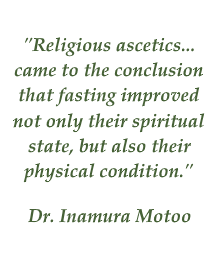Know the precautions to fasting
To engage in healthy fasting we don't need to be the picture of health and vitality. In most cases all that is necessary is average good health.
There are of course, certain precautions.....
- Children should never fast.
- Pregnant and nursing women should never attempt a fast. The effects on the unborn fetus are unknown
and shouldn't be risked. As far as nursing, according to Annemarie Colbin, author of Food and Healing,
who fasted a couple times while nursing, her breast milk seemed to contain less nutrient density even
though the volume remained the same. She says her babies complained as if they weren't getting enough
nutrition.
Ideally, a woman would engage in healthy fasting well before getting pregnant, putting her body in the best possible state to support a growing fetus. The less toxins her body is carrying, the better for her baby.
The pregnant woman can always, of course, improve her diet to include more nutritious foods, but check with your obstetrician before making any drastic or sudden changes.

- Those who should consult a doctor and/or be under his/her care during fasting include: the extremely frail,
those with a weakened immune system, those with eating disorders, medication-dependent diabetes, chronic ailments
such as heart disease, especially if on prescription medication.
With most conditions, it is possible to fast, but the more serious the condition, the more you need professional support during a fast to avoid any problems. If you are on any prescription medications, your requirements for that medicine may vary from day to day. For example, if you are on blood pressure lowering medication, fasting may naturally lower your blood pressure. You wouldn't want to take your full dosage of medicine or your blood pressure may drop too low. You would need a doctor to monitor you daily.
You must take care of yourself. Use your best judgment, and that of your physician, if you have medical issues which leave you uncertain about the safety of fasting in your life. - While rare, longer-term water
fasting (more than 10 days), can drop an individual's electrolyte
reserves too low,
indicated by sudden and extreme weakness or persistent
vomiting. This is the reason to have professional support
during the more intense water fast. Dr. Joel Fuhrman,
author of Fasting and Eating for Health, suggests professional
support for any water fast longer than 2-3 days. (Read
more about his book on the Fasting Resources page.)
This book contains a section a couple pages long in which he discusses other contraindications to longer-term water fasting, such as rare disorders, improper liver or kidney function, and prior medication therapies. - Remember you're fasting to improve your health, not to tear down your body. Use your common sense. There was a method of fasting once
promoted for
losing weight that consisted of fruit juices, coffee, and tea.
Diuretics and blood thinners were also used. This was an extremely
unhealthy fast and followed for too long and in obese patients
with serious pre-existing medical conditions. One person died at 21 days, and another at 56 days. (But, of course, some untold number
lived). This is not healthy fasting, and not what is promoted
here and by other responsible proponents of fasting.
But if you're looking to call fasting "quackery", you can certainly find the rare example such as the above, of quackery fasting.
Be wise when fasting
Healthy fasting is based on nature and natural elements. Water, fresh fruits and vegetables, and even grains are the tools of healthy fasting. Drugs, chemicals, artificial sugars, processed foods, denatured foods, additives are avoided. Attentiveness to your body's messages is always promoted, including the message to stop the fast earlier than you had planned. Fasting is done to help the body cleanse and rebuild, not to tear it down.
Having read the warnings, keep in mind that there are different levels of intensity to fasting. Fruit fasting, rice fasting, and cleansing diets (a form of partial fasting) are all milder methods of healthy fasting. And just a one day fast of that kind, performed occasionally, will deliver you a great deal of benefit and knowledge of your body and emotions and habits. They can also serve to prepare you for longer fasts if that is your goal.
You may also like
Intermittent Fasting offers several unique methods for integrating regular fasting into your life.How long should you fast? Discover what length of time is best for you and how much preparation is required.
Cleansing Diets offers guidance on using a cleansing diet as a partial fast or as a means of preparation for other types of fasting.
Kitchari for Cleansing Information and recipes for using this healthy traditional Indian dish for a fast or for every day meals.
What is Fasting? Dispels any doubts about fasting being akin to starvation.
Recent Posts
-
Valter Longo and the Longevity Diet
Valter Longo's Longevity Diet, which is a fasting mimicking diet, is showing great promise as a prescribed therapy. If you haven't heard of Valter Longo, check out his newly launched website to follow… -
Fasting Overview for Beginners
Information on fasting especially geared toward the beginner. Important guidelines on fasting including the contraindications and how to do a simple one-day fast. -
Meat vs. Vegan | AllAboutFasting
Confusion seems to arise as to whether this site promotes meat-eating or veganism. Let's set the record straight and talk about ideal diets. Ideal for whom? Each of us individually.
